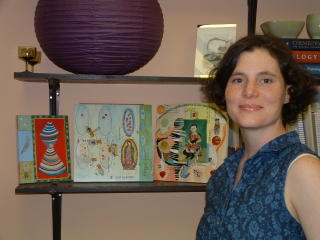I'm in Buffalo with Celia While, my poet friend and I'm having a really good time catching up with her. It's been two years since I've seen her, since Calvin was born. Tonight is my first night away from him, and I thought I would feel really strange, but what I feel is really free. I hope Dave is having an o.k. time. Dave will have his turn this weekend when he goes to Adam's batchelor's party at Cold River. At any rate, I am surprised at how good it feels to be in Buffalo. I could totally see myself here living in a house near Elmwood. We'd have a great time. So, here's hoping it's an option.
More later...
Tuesday, August 30, 2005
Thursday, August 11, 2005

The Thousand Word Version of the "Describe Yourself"
My name is Sarah Averill. I am thirty-four years old. I am married and have two children: Isabel Aster Ella and Calvin Merriwether. We live in Albany New York where we keep a house with a crazy overgrown garden where the kids can pick strawberries, snow peas, and black raspberries in season. The neighbor kids sometimes cut through and help themselves. That’s why we planted so many. I like this urban life with corners that keep me connected to my family’s more rural roots.
I was born in Bangor, Maine to the son of a paper-mill hand, and the daughter of a failed Vermont dairy farmer turned apple peddler. Both of my parents became professionals, my mother a doctor and my father a lawyer. Both remained connected to their more humble origins, and taught me to respect people no matter what their social class or financial means.
These values were reinforced by my education at Cornell’s School of Industrial and Labor Relations and by my experience living at Telluride House, an eccentric institution that offered room and board scholarships to students dedicated to democratic values. While at Cornell I was influenced by the writings of John Rawls, particularly his book A Theory of Justice.
I have an older brother named Patrick and a younger sister named Leah. When she was little she was my tagalong. Excepting the senior prom, she went everywhere with me. At the time I thought nothing of it; it didn’t occur to me to resent it, and now I wonder if it may have kept me out of trouble as a teenager. We lived in Mexico from the time I was in first grade until fourth grade, so I learned to read and write in Spanish. This put something of a crimp in my education: I never did learn to spell English very well, and I have a terrible weakness for Mexican Mariachi music.
I like to sing with my husband and now we are teaching the children traditional songs and sea shanties. He comes from a long line of landlubbers so I don’t know why he so loves the music of the sea. As far as I can tell the only thing he shares with sailors is a certain trepidation about swimming. I, on the other hand, come from a long line of swimmers, but I don’t know of any sailors in my family tree either. I sing along just to keep him company. And it’s such fun to hear Isabel and Calvin piping in too. What will they become when they grow up?
If you were to ask me what I felt my greatest accomplishment in life was so far, I’d have to say being happily married for going on ten years. After that I would add that I’ve found a community and become part of it by participating in the local organizations from the neighborhood association to the school PTA. These are not things that I can put on a resume, but for me this community is what has made other accomplishments possible.
My greatest fear is of dying without getting to finish raising my children. They are my greatest love and my greatest inspiration in this life so far. When I tell people I am going to medical school they have one or two reactions: “Go for it!” and/or, “Who will raise your children?”
My answer is that, just as I do now, I will continue raising them with help from my husband and the community that I have been fortunate to find and build on over the last few years here in Albany. I know I will have less time to paint, and write, and garden, and sing. I know I may miss some of the major events of my children’s lives. This is the compromise that I’ve made in order to follow my path and usher them along theirs
My greatest hope is that I will leave the world a better place for my children and those that come after them. For me becoming a physician is a way of making this hope a reality. I know intimately that the world is in terrible trouble and that there are a lot of reasons to despair. Refraining from cynicism is as close to a religious practice as I have.
June 15, 2005
Dear Margaret,
It pleased me; the way you appeared, as if from nowhere, quietly at my back door, like an old friend just stopping in from down the street. How I wish you lived closer and could do just that. You are like a sister to me now; a chain to the past and other half of the stories that I grew up on; a rope that pulls me into the future, more whole and more sane than I’d be without you. And, in some ways, you are a mirror, too, telling me who I am. In the reflection from the gnarled surface of the family that stayed in place, I am becoming more solid. There is substance where once I felt only the wind, the hollow vacuum of un-belonging to place, to community, to family, to history. I am putting down roots in this new place, where I am finally becoming, and becoming, and becoming…
I have pictures of you in the yard, perched on Calvin’s Little Tykes chair, like a farmer on a three-legged stool, with the foxgloves just beginning to bloom behind you. You are lovely, and at home, on my small fifty-by-thirty-foot plot, peeling apples from the hand-made ash basket you brought from Westfield. There are still a few apples in the basket, which now sits on the floor in my kitchen, next to the refrigerator. They have been kept too warm by the heat it gives off this time of year, and have begun to take on the sweet, waxyness of apples in autumn. It is the odor of your Uncle Patrick’s (my grandfather’s) truck, the smell of my murky childhood. I will always associate that smell with him and the mysteries of our family’s schism from the Vermont Rowley clan.
How strange and wonderful that we should have become friends these fifty-odd years after his exile. I have such a hard time attending to the demands of my immediate family, complicated by the alienation, passed on generation-to-generation, stemming from Pat’s irreverant, innatention to the collective family aspirations. What they were, we keep wondering, and characterizing, even scoffing in our ignorance, even as it diminishes with added details. Did they really want a dairy farming empire in Milton? What really drove them? How much did the girls really contribute to the farmland purchases for the men? Were there others who wanted to get out from under the matriarch? Did they get out, get away from the dominion of Helen Rowley, or did she continue to dominate them even from the grave? And what about him, Helen’s husband, Pat’s father? Who was he other than a state senator? How shamed was he by his son’s record of mischievous misdeeds, and then unfortunate transaction, that landed him in jail, with a cold shoulder from the exhasperated family? What did grandpa Pat’s father think? I never hear about him.
How much/many of the truth/s will come out? Does it even matter anymore? Somehow, I keep wanting to pry open the past, even as I find the present unbearable—Pat’s trangression’s did not stop when he left Vermont, collecting his children and wife from the places they sheltered during his stint in jail for selling the cows. Things may have been easier if his story had stopped there, but it was just the beginning of a series of dislocating events. Now, I wonder if any of it matters. It does. It does, I know, but I’d like sometimes to think that it might not.
When I was a kid, I loved climbing up into the attic at 618 S, Beech Street, where Pat and his wife, Mazel, my mother’s mother, ended up living when my mother headed off to medical school in Mexico, aspiring to physicianhood, like the children of aunt’s and uncles that remained true to the clan. When Mazel’s mother moved in with her from Vermont, after her husband Ralph died, there were lots of boxes of old things, china, cufflinks, hatpins, stacked, and sorted, then as the years passed, picked over, and disorganized-- probably nothing valuable, but they had a certain allure, just because they were old, and they were in the attic, where the light is strange, and even the dust is romantic.
Now, I don’t think I’d think much of the odd assortment, just the sorts of things you’d see at any ordinary rummage sale. Everything valuable had long since been sold. I wonder, if the whole mess with Pat will seem like that in a few years, as the last of the siblings involved in the conflict pass away, and only the cousins remain—1st and 1st, once removed; will it all seem dusty and boring, even downright plebian, like a tired Sunday diatribe—just another American family with an old horse to beat.
Perhaps we can open our mouths in merriment and let the flood of emotion pent up too long run like the spring snow melt, clear over the cobbles, just smoothing them a bit in gentle eddies of song and scented seasons.
Love,
Subscribe to:
Comments (Atom)

